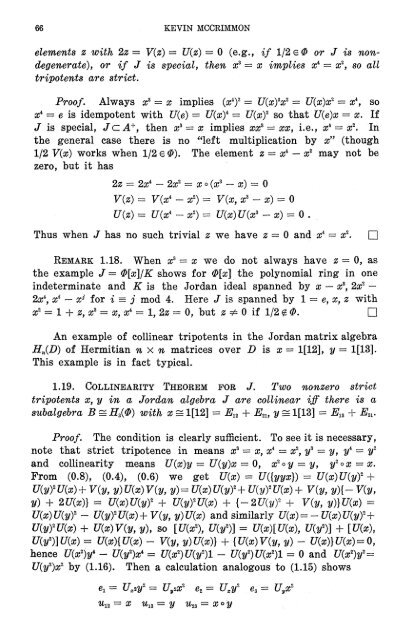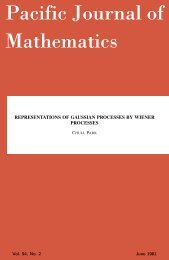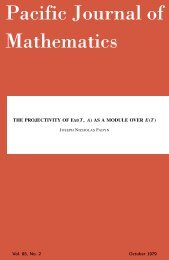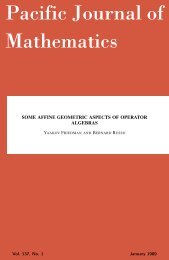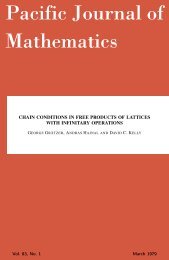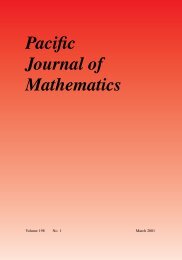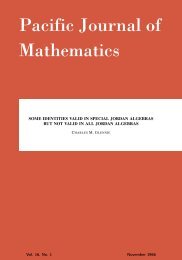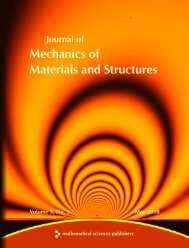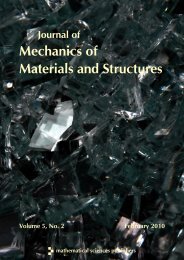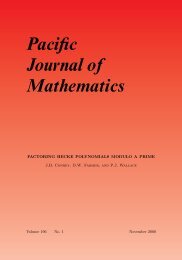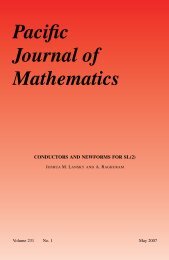Compatible Peirce decompositions of Jordan triple systems - MSP
Compatible Peirce decompositions of Jordan triple systems - MSP
Compatible Peirce decompositions of Jordan triple systems - MSP
Create successful ePaper yourself
Turn your PDF publications into a flip-book with our unique Google optimized e-Paper software.
66 KEVIN MCCRIMMON<br />
elements z with 2z = V(z) = U(z) = 0 (e.g., if 1/2 eΦ or J is nondegenerate),<br />
or if J is special, then x z = x implies # 4 = x 2 , so all<br />
tripotents are strict.<br />
Pro<strong>of</strong>. Always x z = x implies (# 4 ) 2 = U(x) z x 2 = U(x)x 2 = cc 4 , so<br />
# 4 = e is idempotent with U{e) = £7(x) 4 = i7(cc) 2 so that Ϊ7(e)# = cc. If<br />
J is special, Jc4 + , then x z = x implies xx z = xx f i.e., x i = # 2 . In<br />
the general case there is no "left multiplication by x" (though<br />
1/2 F(cc) works when 1/2 6 Φ). The element z = x* — x 2 may not be<br />
zero, but it has<br />
2z = 2α 4 - 2OJ 2 = χo(χ z — ac) = 0<br />
F(z) - F(α 4 - α 2 ) - F(x, x* - a?) = 0<br />
I7(») = C/(x 4 - x 2 ) - U(x)U(x z - x) = 0 .<br />
Thus when J has no such trivial z we have z = 0 and # 4 = α; 2 . Π<br />
REMARK 1.18. When α; 3 = cc we do not always have z = 0, as<br />
the example J = Φ[cc]/J5Γ shows for Φ[x] the polynomial ring in one<br />
indeterminate and K is the <strong>Jordan</strong> ideal spanned by x — x z , 2x 2 —<br />
2# 4 , x i — cc 5 " for £ ΞΞ j mod 4. Here J is spanned by 1 = e, x, z with<br />
x 2 = I + z,x 3 = x,x* = 1, 2z = 0, but z Φ 0 if 1/2 £ Φ. •<br />
An example <strong>of</strong> collinear tripotents in the <strong>Jordan</strong> matrix algebra<br />
H n{D) <strong>of</strong> Hermitian n x n matrices over D is x — 1[12], y = 1[13].<br />
This example is in fact typical.<br />
1.19. COLLINEARITY THEOREM FOR J. Two nonzero strict<br />
tripotents x, y in a <strong>Jordan</strong> algebra J are collinear iff there is a<br />
subalgebra B ^ H S(Φ) with x ^ 1[12] = E 12 + E 21, y s 1[13] = E ίZ + E Ά.<br />
Pro<strong>of</strong>. The condition is clearly sufficient. To see it is necessary,<br />
note that strict tripotence in means x s<br />
— x, x i<br />
= x 2<br />
, y z<br />
= y, y* = y 2<br />
and collinearity means Z7(α?)i/ = U(y)x = 0, x 2<br />
°y — y, y 2<br />
°x = α?.<br />
Prom (0.8), (0.4), (0.6) we get I7(α?) = U({yyx}) = U{x)U{y) 2<br />
+<br />
U(y) 2<br />
U(x)+ V(y, y)U(x)V(y, »)== U{x)U(y) 2<br />
+ U(y) 2<br />
U(x)+ V{y, y){- V(y,<br />
y) + 2[7(α)} = U{x)U{y) 2<br />
+ U(y) 2<br />
U(x) + {-2t%) 2<br />
+ F(», tf)}CΓ(α) -<br />
U(x)U(y) 2<br />
- U(y) 2<br />
U(x)+V(y, y)U(x) and similarly U(x)=-U(x)U(y) 2<br />
+<br />
U(y) 2<br />
U(x) + U{x)V{y, y), so [E7(s 2<br />
), W)] = U(aί)[^), C^(2/ 2<br />
)] + [I7(aθf ^(ί/ 2<br />
)]^) = i7(α;){ί7(α ) - V(y, )EΓ(»)} + {?7(x)F(7/, ») - ; tf U(x)}U(x)=0,<br />
hence ?7(α; 2<br />
)ι/ 4<br />
- U{y 2<br />
)x* = U(x 2<br />
)U(y 2<br />
)l - U(y 2<br />
)U(x 2<br />
)l = 0 and U(x 2<br />
)y 2<br />
=<br />
U{y 2<br />
)x 2<br />
by (1.16). Then a calculation analogous to (1.15) shows<br />
βi = i/^?/ 2 = ε7 y2X 2 e 2 = U xy 2 e z - i7,x 2<br />
u 12 = x u 15= y u 23 — χoy


